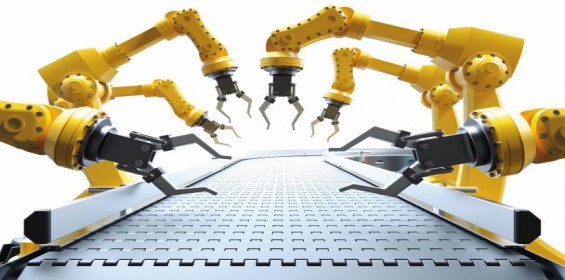The Talking Industry Live keynote session was followed by three panel discussions. A snapshot of the discussions are highlighted below.
The full sessions are available to listen to as podcasts.
Robotics and Automation (with Mike Wilson, Chief Engineer – Automation – for the High Value Manufacturing Catapult, and Chief Automation Officer at the MTC; Stuart Coulton, Marketing Manager, Omron UK; David Dearden, Managing Director, Euchner UK; and Alan Sheppard, Managing Director, LCA Group).
After the keynote, it was sobering to reflect that the UK’s performance in adopting robotics is so slow.
Mike Wilson pointed out that the critical skills shortage and the departure of many EU workers may force the hands of many business owners, though perhaps for the wrong reasons. “As a consequence of that, our manufacturing has not been as successful as we would like, and it has been shrinking over the past 20 years,” he said. “We’ve offshored a lot of our manufacturing capability. And we really need to find a way of reversing that trend.”
The speakers worked through some of the factors that the UK needs to address. Dearden felt that larger organisations often exhibit short-term thinking, while the return-on-investment is not overnight. Coulton added that the UK’s financial infrastructure does not facilitate high-level investment in capital equipment, while noting that the country lacks system integration capacity. Sheppard sees both sides of the coin, both as a user of automation equipment and with customers looking to increase their automation levels. “I think one of our biggest challenges is around culture,” he said. “We are a fairly small country which is conservative in its business outlook. And I think we really do need to try and embrace change.”
OEE and Digital Manufacturing (with Stuart Cartwright, Chief Engineer for Technology – Digital Engineering at the MTC; Duncan Stanton, Managing Director of Lamonde Automation; Luke Walsh, Managing Director of Brainboxes; and Sam Kirby, Industrial Automation Specialist at Novatech).
Overall Equipment Effectiveness (OEE) is the gold standard for measuring manufacturing productivity. While there is a mathematical basis for it, with most UK manufacturers being below 60%, and more than half under 40%, this session focussed on some of the measures available to improve things.
The first thing which transpired was that the figures are not necessarily as bad as they appear! Walsh insisted that we should not fear the numbers and what they could mean, because that’s one of the first things that often puts people off from starting that journey.
“We see OEE is a great tool, but just one of those available when you when you are about digital manufacturing,” said Kirby.
“A lot of focus needs to be bringing on that base OEE level up, before you start focusing on productivity, otherwise you may be wasting your money,” Cartwright added.
Stanton emphasised the importance of human-machine interaction. “One of the things that is often overlooked with OEE is the semantics of the human interaction with machines, how quickly problems are reported and resolved. Because unless you’ve got a completely ‘human-less’ factory, you’re going to have some form of human intervention when that red or that amber light lamp comes on. And it’s often how that is dealt with, how it’s reported, that can drive efficiency forward. Getting information to an operator is as much part of solving the problem as having a more efficient machine.”
AI & Industrial Data (with Roman Kastusik, Lead Product Architect at T-DAB.AI; Mostafizur Rahman, Technology Manager AI & Data Science at the MTC; and Stuart McLeod, Technology Manager and Business Unit Lead, also a the MTC)
The final session covered technical aspects of AI and industrial data. The MTC’s Mostafizur Rahman said that applying AI to machines is a different challenge to applying it in other areas because of the number of variables, and the uncertainties in measuring and interpreting the data.
McLeod agreed: “A manufacturing system has to operate 24/7,” he said. “It’s a very complex system with large amounts of data, which could be data about production, quality, cost, performance, time, or critical information. They are all different and have to be handled in different ways.”
Roman Kastusik highlighted another aspect of the problem: “Starting small is always a good idea,” he suggested. “However, the problem that we often see a barrier to sort of scaling. If you want to train on data from hundreds of machines, the project suddenly becomes much more complicated. So many projects never leave the proof-of-concept (POC) stage. While it is necessary to start small, the path to big should be clearly mapped out. Otherwise, you might never get there.”
Running alongside the three panel discussions throughout the day were a series of six 45-minute exciting and highly topical seminars including presentations on Why condition monitoring? Why not? Vincent Burson – IFM; Mobile Robotics: Mobile, flexible & resilient – The factory of the future, Mike Payne – KUKA; Additive Manufacturing: Automated 3D Printing, Luke Rogers – AI Build; Collaborative Automation: Solving the UK Productivity Puzzle, Barry Graham – OMRON; Prepare for the Future Today, Nikesh Mistery – GAMBICA; and What is Made Smarter? The benefits of adopting digital technology within your business, Jim Vithanage – Made Smarter.
In addition, there were two in-depth workshops provided by the event’s content partners. Euchner UK’s session focused on managing equipment safety and cyber security in the modern factory. The second provided by Rittal/Eplan, covered smarter panel building.
There was also the opportunity for delegates to see ground-breaking products and innovations from KUKA, Werma, Motor Technology, Novotek, Euchner, Rittal, Eplan, Weidmuller, Omron, BCAS, Charter Controls, Made Smarter and many more, thanks to a micro exhibition that ran during the event
Podcasts of the Talking Industry Live sessions are available from https://talkingindustry.org/podcast and major podcast sites. Talking Industry Live will return next spring.
https://twitter.com/TalkingIndustry
https://www.linkedin.com/company/talking-industry/

